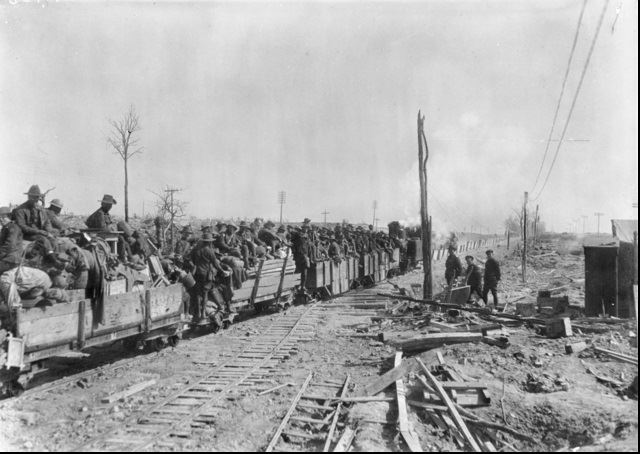Difference between revisions of "4th Pioneer Battalion"
From Our Contribution
(→Battalion Personnel) |
(→Battalion Personnel) |
||
| Line 30: | Line 30: | ||
===Battalion Personnel=== | ===Battalion Personnel=== | ||
* [[Richard Evans MM]] | * [[Richard Evans MM]] | ||
| − | * [[James Kershaw]] 16 Mar 1916 - | + | * [[James Kershaw]] 16 Mar 1916 - 2 Jan 1919 |
==Battle Honours== | ==Battle Honours== | ||
Revision as of 18:47, 28 February 2021
 | |
 4th Pioneer Battalion near Warlencourt AWM E00468 | |
Contents
Brief History
The 4th Pioneers were established on 10 March 1916, at Tel-el-Kebir in Egypt, and were subsequently assigned to the 4th Division. The battalion subsequently served on the Western Front from mid-1916 until the end of the war.
Trained as infantrymen, they were also tasked with some light combat engineer functions, with a large number of personnel possessing trade qualifications from civilian life. As such, they were designated as pioneer units. At the same time, they could be pressed into the line to fight alongside regular infantry where required.
Consisting largely of volunteers drawn from Queensland, the battalion consisted of four companies, under a headquarters company
Arriving in Europe in mid-1916, the 4th Pioneers gained experience in trench warfare around Armentieres, however, by July they were required at Poziéres where they took part in the defence of the heights during the final phase of the Battle of Pozières.
This would be their first major battle of the war and for the next two-and-half-years, the battalion took part – albeit in a support role only and never in their infantry role – in most of the major battles that involved Australian troops. The Battle of Mouquet Farm, the Battle of Bullecourt, the Battle of Messines, the Third Battle of Ypres, the Spring Offensive – with defensive actions around Hebuterne and Dernancourt – and the Hundred Days Offensive, which finally brought an end to the war in November 1918.
The battalion's final actions were fought around Bellenglise, along the St Quentin Canal, in mid-September 1918 in support of the 4th Division's final assault on the Hindenburg Line. The battalion was disbanded in Apr 1919.
Battalion Personnel
- Richard Evans MM
- James Kershaw 16 Mar 1916 - 2 Jan 1919
Battle Honours
According to Alexander Rodger, as a result of the decision not to re-raise pioneer battalions in the interwar years, no battle honours were subsequently awarded to the 4th Pioneer Battalion – or any other First World War pioneer battalion – as there was no equivalent unit to perpetuate the honours when they were promulgated by the Australian Army in 1927[1]
Individual Honours
- 2 Distinguished Service Orders
- 14 Military Crosses
- 4 Distinguished Conduct Medals
- 44 Military Medals - (Richard Evans MM)
- 6 Meritorious Service medals
- 29 Mentioned in Despatches
- 8 foreign awards
Notes
Content for the history and honours sections has come from a combination of Wikipedia and the Australian War Memorial websites.
- ↑ Rodger, Alexander (2003). Battle Honours of the British Empire and Commonwealth Land Forces 1662–1991. Marlborough, Wiltshire: The Crowood Press. ISBN 1-86126-637-5.